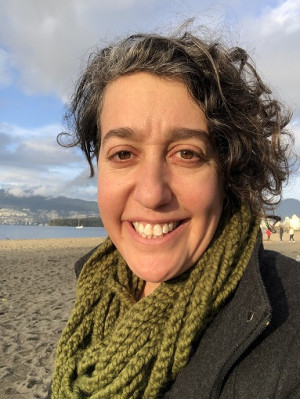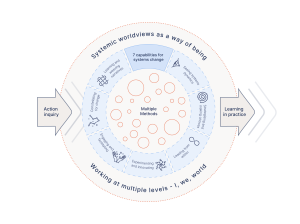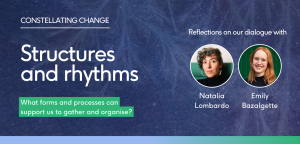This thought piece is part of a series sharing key insights from Constellating Change, our 2023/24 learning and practice series that shone a light on the dynamics and patterns of organising for systems change. It is written by Sean Andrew, Learning and Practice Partner Lead at the School of System Change.
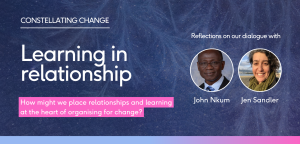
We kicked off our Constellating Change series in October 2024 with contributors John Nkum and Jen Sandler. Our first session explored the interconnections between relationships and learning, two core dimensions of how we might organise for change. John joined us from Ghana as a Gestalt organisational development and change practitioner, working across organisations and government, and Jen, as a participant and engaged researcher, partnering with community organisers and power-shifters from Massachusetts.
Meet Our Contributors
Together we acknowledged how entangled and mutually reinforcing relationships and learning are. They are the critical yeast we must knead in the everydayness of organising. Healthy relationships can build trust: encouraging people to listen openly and share difference. Learning together can expand our sphere of awareness and understanding of one another. Relational learning is therefore an interactive evolving cycle that creates healthy conditions and dynamics for us to work with the complexity of organising for change.
The Relational Learning Paradigm
“Relationships are the vessels of learning.” - John Nkum
John reminded us that the relational side of learning has been with humans as long as we’ve told stories. Its roots are in a reciprocal, circular community process where roles are fluid: a teacher learns through teaching, a learner teaches as they learn.
This way of being together preexists and evades the dominant modern model where - at some point - those roles became more binary and fixed - the teacher began to stand while the learner took a seat on the ground. The power between who shared and who listened became one-directional. Knowledge became a commodity that is stored and traded selectively.
For Jen, there’s a parallel with how museum collections are built. A few, privileged actors have the power to curate knowledge from here and there, which is then frozen and stored. With static and defined sources of knowledge, the creation of learning loses its nuanced multiplicity of process and form. Questions come to be seen as problems that require engineered solutions, determined by those who decide which artefacts are worthy to collect and display.
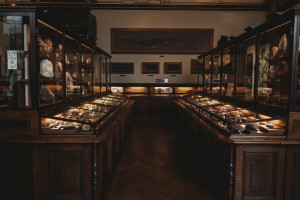
How might we resist the acclaimed title of being a ‘learning organisation’, while perpetuating society’s dominant ways of creating and sharing? How might we invite in a qualitative, relational exchange where the roles of teacher and learner are fluid once more?
Resisting the Modern Model
Our conversation brought forth many modes of resistance and reconnection, like what if we re-remembered the power of sitting in circle?
A circle can be a space where exchanges of experience and perspectives flow in a spiraling process of deepening and expanding. This takes time. Sitting with this process invites us into surprise. Circles can give voice to quieter, more understated experiences, which in turn can give way to different ways of learning, sharing, knowing and experiencing, in all their plurality of forms and temporalities.
“What if learning was slow, stopped, engaged with people at length, as a process, journey, and situated in context? This mode of learning as not being transactional changes everything.” - Jen Sandler
Opening up the information we use to make meaning helps our sensemaking and decision-making to become less like an artefact in a museum collection and more like a tapestry we are weaving and discovering between us, here and now. This is emergence. We may feel impatient, but this is a form of relational learning with the potential to make us wise, not just knowledgeable.
Learning in relationship might not be easy in many of our contexts, where real-world challenges cry for urgent response. But its understated value is to build our awareness of our tolerance for ambiguity, our relationship with the roles we play, and the time we take together.
Learning and Doing
“The conundrum of how much we learn versus just mak[ing] things happen is something I don’t know how to find the balance of.” - Series participant
We also explored how - in systems change work and organisations - learning and doing are often held in opposition, rather than as two modes that can be simultaneous and symbiotic.
Rather than seeing learning as an artificial pause at the end of a project, John asked, how can we see learning as the project? How can the process of doing something, experiencing it, making sense of it and then deciding what the next step might be - acting differently or not - be woven into our organising and change work?
Bridging the perceived learning and doing gap requires feedback cycles of healthy communication to enable this spiralling process. As Jen shared, learning is happening between people all the time, in all of our work. The question then is less about if we are learning but rather how we are learning together. It’s important to cultivate an honest awareness of how learning happens within ourselves and between us, so that we can observe and inquire into whether these dynamics are enabling or inhibiting us.
Practicing this awareness has the potential to disrupt the perpetual - often heart-breaking - reality in organising for change: the rift between our intentions and what is actually being embodied, enacted and experienced between us. Rather than seeing learning as a discrete tool of problem-solving - often enmeshed in reductionist, linear worldviews - this attention treats learning in relationship as a resolution in and of itself: an entry point to creating healthy conditions for our work in the world.
Learning Into a New Paradigm
For Jen, this process of being with our experience and moving at the pace of relationality is not an interlude, it is everything - a chance to transform the tyranny of action by acting relationally. For it to become possible, we need to build flex into our social systems. Learning in relationship means that we have to embrace mistakes, failures, forgiveness, and grace. Here we see adapting as a signal and progressive marker of change - as well as a being in the questions together.
We closed the session with words from Rainer Maria Rilke and Tyson Yunkaporta who remind us of the perpetual and joyful nature of what living to learn might mean for us:
“Be patient toward all that is unsolved in your heart and try to love the questions themselves, like locked rooms and like books that are now written in a very foreign tongue. Do not now seek the answers, which cannot be given you because you would not be able to live them. And the point is, to live everything. Live the questions now. Perhaps you will then gradually, without noticing it, live along some distant day into the answer.” - Rainer Maria Rilke
“If people are laughing, they are learning. True learning is a joy because it is an act of creation.” - Tyson Yunkaporta, Sand Talk: How Indigenous Thinking Can Save the World
Learning and Practice Invitations
- Social Fabric: Focus on relationships and critical connections versus critical mass by finding ways to centre how people are relating and their experience of this. Try appreciative feedback where you evaluate the relationship - not the person - as a way in with colleagues.
- Feedback: Explore how you can integrate tight feedback loops in your working rhythms by reflecting on both how we are working together (e.g. how we have difficult conversations) and what we are doing together (e.g. what’s happening in our projects).
- Ways of being: Notice what dominant forms of learning and doing you have inherited in yourself and/or team, and surface the plurality of how different people learn and want to work together. Use the Kolb learning cycle by centering experience. Note, some research cites that working with preferred learning styles may not be the most beneficial way to learn; so rather find the learning style that matches the context and a person’s edge.
- Documenting: Ask yourself what, where and how you are collecting knowledge and documenting. Who does this? Where is it stored? Who has access? Why are you doing this in the first place?
Deeper Dive Resources
- Blog: Tana Paddock, ‘Learning in Relationship’ (2010). Published on Organization Unbound.
- Report: The Barefoot Guide, ‘Learning Practices in Organisations and Social Change’ (2010). Published on The Barefoot Guide Connection.
- Article: Microsolidarity, ‘From Domination to Partnership’ (2022). Published on Microsolidarity Gitbook.
- Resource hub: The Relationships Project, ‘Relationships Resource Repository’ (2023). Published on the Relationships Project website.
- Book: Nora Bateson, Combining (2023). Published by Triarchy Press. The book touches on aspects of relational learning.
- Blog: Anna Birney, ‘Working in the Marshlands’ (2022). Published by the School of System Change on Medium.
- Blog: Anna Birney, ‘Learning is Change’ (2023). Published by the School of System Change on Medium.
- Framework: Tamarack Institute, ‘Triple Loop Learning’ (2017). Published on the Tamarack Institute website.
- Blog: Richard Bartlett, ‘No More Drama at Work: How to Build a Feedback Culture (2023). Published via the Hum.

Written by Sean Andrew
If you're interested in bringing this learning into your organisation or network, get in touch with Sean, our Learning and Practice Partner Lead. To keep inquiring with us as we explore more themes, subscribe to the School newsletter for systems change insights, inspiration and resources.





